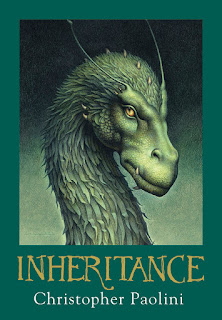Finally … It only took me a few years to finish reading the final book in Christopher Paolini’s four-book Inheritance Cycle, aptly named Inheritance. Now I have many thoughts and feelings on the series, and they are…complicated.
And perhaps here I must add that it is telling that Paolini hasn’t published anything since 2011, according to his Wiki page, though apparently the books have sold well and he is apparently still writing.
My overall opinion of Paolini’s writing is that it’s adequate. He carries a story, but the prose is workmanlike and doesn’t sing off the pages. The setting itself is stock-standard Tolkien, while the overarching narrative arcs across the four novels follows a rather Star Wars-esque, farmboy-turned-godlike-hero fighting the Evil Big Bad. With a side order of Dragonriders of Pern, of course. To be quite honest, not much in the four books really stands out for me beyond the ever-escalating conflict with the evil king Galbatorix that culminates in the big battle at the end. Granted, I had gaps of years between reading the books, so I’m hard pressed to recall anything that knocked my socks off. Okay, I lie. I love dragons. Any interaction with Saphira was sufficient to make me happy.
I don’t feel a particular connection with Eragon, however – he’s very much an everyman thrust into extraordinary circumstances. I mean, who wouldn’t want to feel an awesome bond with a dragon? (There’s a reason why I’ve reread all Anne McCaffrey’s DRoP books at least three times.) The first half of Inheritance plodded along, and judging by how long I took to actually read this book, it’s an indication that I struggled to remain engaged. Though I’m OCD enough to actually finish, despite my lukewarm assessment.
Things eventually picked up during the second half, but to be quite honest, I think I mainly soldiered on because the book was a review copy that landed on my desk a long while back, and I’m laden with an additional burden of guilt that my copy has an author-signed bookplate.
Okay, okay, the cycle isn’t unreadably bad. But in terms of fantasy, the books don’t cover fresh ground, and are essentially a remix of the tropes that initially gained popularity in Tolkien. Not that I have an issue with standard, D&D-style fantasy. Hells, I’m a huge fan. But I need a bit more oomph, a touch of an author’s identity creeping through, breathing life into a setting beyond the elves, dwarves, and dragons.
The Inheritance Cycle could have benefited immensely from having its sprawling narrative pared down and streamlined. Three books instead of four, perhaps. That might’ve gone a long way to sort out the pacing issues. Something else I fear hampers the story is the sin of Too Much Awesome – in other words, characters who are so super-powerful, so soon in the story and with so little apparent effort, that they are akin to gods. It’s incredibly difficult to build tension with decent try-fail cycles if your main characters can almost literally move mountains with a mere thought.
I think if the Inheritance Cycle is your introduction to fantasy as a genre, you’re probably going to lap it up and it’ll act as a gateway to other authors (it can be hoped). So in terms of it being so immensely successful and possibly getting so many folks reading fantasy, it’s not such a bad thing (hey, any successful book that gets folks reading is awesome, in my mind, even the FSoG phenomenon, as much as I love to put the hate on it). But the writing for the Inheritance Cycle could have been stronger, more nuanced in my opinion. Therein lies the rub. Paolini was in his mid-teens when he wrote Eragon, and it was also very much a case of being in the right place at the right time in terms of his parents’ involvement in the publishing industry and the immense support he received from them. He had the kind of head start most authors can only envy, and while this sort of good start is no guarantee of success, Paolini hit that magical sweet spot many can only dream of. Whether he’ll ever be able to follow up on these books, remains to be seen.


No comments:
Post a Comment